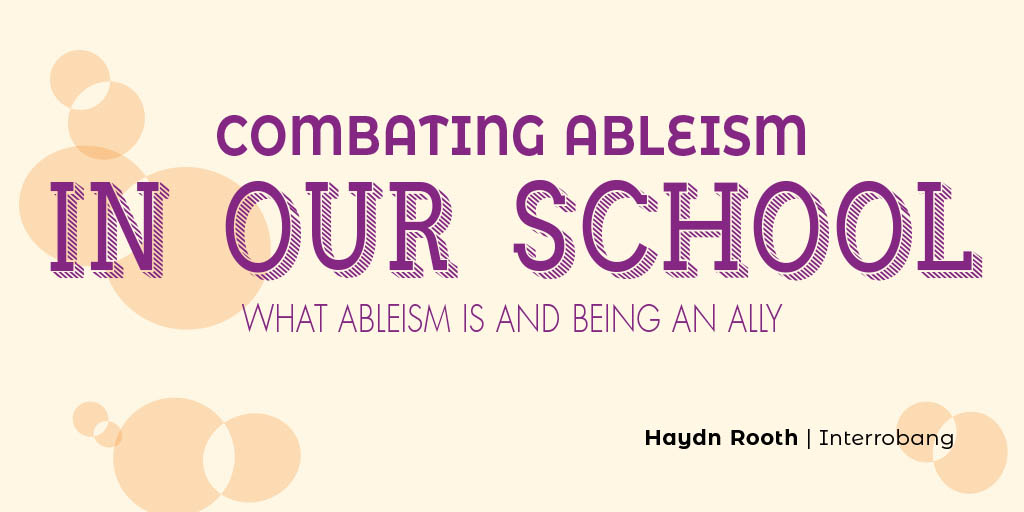Combating ableism in our school: what ableism is and being an ally

Ableism is discrimination in the favour of able-bodied people. With that said, most people reading this are probably thinking to themselves that they do not do anything outwardly ableist on purpose. You may not be actively discriminating against disabled people in a visible way, but every action you make can have a lasting impact on those affected.
Ableism takes many forms and oftentimes people do not realize that they are treating disabled individuals differently. This often comes from a place of ignorance or unfamiliarity leading to unfortunate assumptions that leave disabled people feeling downtrodden. Simple things like using the only wheelchair-accessible stall in the bathroom is ableist. Ableism is rampant in today’s society as most people do not see the issues around them. It’s time to start seeing issues, taking action and making the world a better place for everyone.
HOW TO COMBAT ABLEISM AND BECOME A PROACTIVE ALLY:
Educate yourself: Learn about different forms of disability and the challenges that these people face daily. A better understanding of what disabled people go through will allow you to better empathize with them and will lead to a greater understanding of ableism in everyday life. The National Centre on Disability and Journalism (ncdj.org) has a large database of resources that aid disabled individuals. As an ally, this database is a great way to educate yourself on greater issues. Knowledge is power!
Vocabulary check: Most people know to not use derogatory terms like ‘retard’ or ‘midget’, but did you know that words like ‘blind’ can be offensive in the wrong context? Common terms like ‘idiot’ are used a great deal in common language but these terms are offensive. They derive from historical context in which the term would be used to demean someone who may lack a certain level of cognition. Essentially, if the descriptor you are using to demean someone comes from a place of disability, you are directly contributing to ableist thought. If you do not have anything nice to say, do not say it at all.
Accessible areas: One thing that many able-bodied people do is use accessible resources that are in place for disabled individuals for their own personal use. The biggest example is the misuse of the handicapped bathroom stall.
Another example of this is the elevator. For so many people just getting to the second floor of a building is a daunting task. The elevator is in place for these people to be able to freely maneuver up and down the building. Think twice before using the elevator up to the second floor because you do not feel like taking the stairs.
Taking the bus is a great equalizer amongst strangers. There are priority seating areas towards the front of the bus for the convenience of disabled, pregnant, injured or simply old people. Able-bodied people will sit in these seats when someone does not need it. This is generally okay, but many people misuse this and prevent those who actually need it from sitting.
General tip: Just stand or find a seat near the back to make room for the people who need seats more than you.
Final thoughts: The best way to combat ableism is to make changes in your own life. Make conscious decisions to change your vocabulary in order to not offend disabled individuals. Generally practising mindfulness in the terms of understanding your privilege will allow you to stay in your lane whilst recognizing the ableist injustices that occur around us every day.
Do not patronize or infantilize disabled individuals. Its commonplace for able-bodied individuals to infantilize a disabled individual while trying to help them with something. Chances are a disabled individual only will need help if they ask for it. If they ask for help, absolutely do it. But do your best not to assume anything.
Above all, remember the golden rule: Treat others as you would like to be treated yourself.















